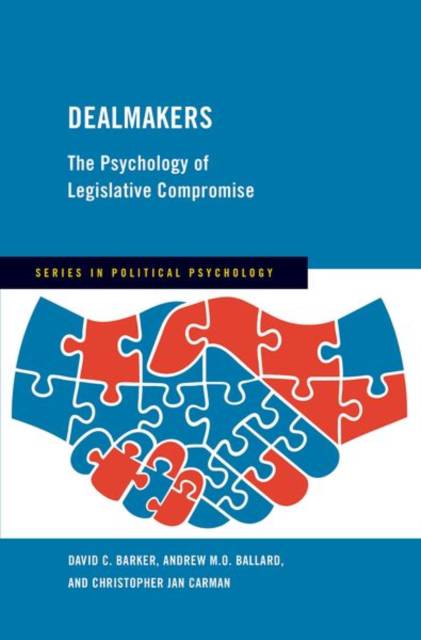
Bedankt voor het vertrouwen het afgelopen jaar! Om jou te bedanken bieden we GRATIS verzending (in België) aan op alles gedurende de hele maand januari.
- Afhalen na 1 uur in een winkel met voorraad
- In januari gratis thuislevering in België
- Ruim aanbod met 7 miljoen producten
Bedankt voor het vertrouwen het afgelopen jaar! Om jou te bedanken bieden we GRATIS verzending (in België) aan op alles gedurende de hele maand januari.
- Afhalen na 1 uur in een winkel met voorraad
- In januari gratis thuislevering in België
- Ruim aanbod met 7 miljoen producten
Zoeken
Dealmakers
The Psychology of Legislative Compromise
David C Barker, Andrew M O Ballard, Christopher Jan Carman
€ 112,95
+ 225 punten
Omschrijving
Compromise is critical to democratic policymaking, but it can be hard to find on Capitol Hill. In this era of normalized gridlock, however, some politicians do still cross the aisle. In Dealmakers, David C. Barker, Andrew M.O. Ballard, and Christopher Jan Carman examine when this occurs and why the politicians that do so tend to be Democrats. The answer, the authors contend, comes down to partisan differences in personality and values among voters. Specifically, they suggest that empathetic traits and values drive Democrats to accept compromise, whereas competitive traits and values drive Republicans to reject it. As the authors show, these differences can filter up through the ballot box to the halls of Congress. Drawing on evidence from opinion surveys, randomized experiments, Twitter, and legislative transcripts, Dealmakers evaluates the train of openness, altruistic values, and other political and psychological factors that play a role in political compromise.
Specificaties
Betrokkenen
- Auteur(s):
- Uitgeverij:
Inhoud
- Aantal bladzijden:
- 256
- Taal:
- Engels
- Reeks:
Eigenschappen
- Productcode (EAN):
- 9780197801390
- Verschijningsdatum:
- 5/12/2025
- Uitvoering:
- Hardcover
- Formaat:
- Genaaid
- Afmetingen:
- 166 mm x 237 mm
- Gewicht:
- 503 g

Alleen bij Standaard Boekhandel
+ 225 punten op je klantenkaart van Standaard Boekhandel
Beoordelingen
We publiceren alleen reviews die voldoen aan de voorwaarden voor reviews. Bekijk onze voorwaarden voor reviews.









